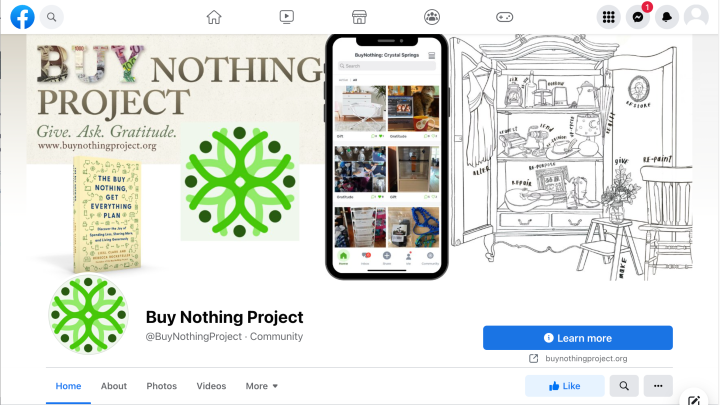
What happened to the Buy Nothing Project?

E-commerce platforms are ubiquitous in today’s economy. The Department of Commerce estimates that U.S. retail e-commerce sales were $262 billion in the fourth quarter of 2022, accounting for 14.7% of the total.
Used items are part of the mix, and sites like Craiglist, eBay and Poshmark are great places for people to get (or get rid of) them. But what about the stuff you can’t sell — like a busted couch, eggshells or even a half-eaten pizza? Enter Buy Nothing.
Buy Nothing is an online community where members can ask for what they need or share items they no longer need. The project started on Facebook and was based in Bainbridge Island, Washington, but local chapters eventually popped up across the country and the globe. But as Buy Nothing expanded, it started to crack under the pressure of capitalism.
“Marketplace” host Kai Ryssdal spoke with Vauhini Vara, a contributing writer for Wired, about her article detailing the rise and fall of the Buy Nothing Project. The following is an edited transcript of their conversation.
Vauhini Vara: I learned about Buy Nothing through my mom, who for a long time lived in the Seattle area, where Buy Nothing got started, and she does much of her acquisition and getting rid of things on Buy Nothing.
Kai Ryssdal: When you say you can ask for or give away anything you don’t necessarily want, you actually mean anything, right? Just to sort of set the stage here.
Vara: Yes. Like, it’s very common for people to put rocks from their yard on Buy Nothing. In my town’s Buy Nothing group, people have given away like a half-eaten pizza. Yes, like truly, truly anything you can imagine has been gotten or given away on Buy Nothing.
Ryssdal: OK, so with that as background, give me sort of the 30-second version of this long and — it’s a complicated story that you wrote in Wired about Buy Nothing and how it started and sort of where things wound up.
Vara: Yeah, so Buy Nothing was started by these two women from Bainbridge Island, Washington — Liesl Clark and Rebecca Rockefeller — who came together and were like, “You know what, let’s start a local Facebook group in Bainbridge Island, our community.” Basically, it blew up. It got so big that they ended up helping other communities nearby start their own Buy Nothing groups. And eventually, within like really just a couple of years, it became this national phenomenon — and then this worldwide phenomenon, where there are Buy Nothing groups on Facebook. And they started to feel, in part, because of things that were happening in the wider world, like around 2016, 2017, 2018, like, there was something that was a bit dissonant about their presence on Facebook, which is this very corporate platform. It was all supposed to be this community where everything was about doing things outside of the money economy.
Ryssdal: Right. And the dissonance makes sense, right? Launching on Facebook, this platform that’s about as “acapitalistic” as you could probably ever want to get.
Vara: Absolutely, exactly. They tried various efforts to get off of Facebook. They first started to, like, try to fundraise within their community. But then some people in their community were upset about that, understandably, because the community was supposed to be all about not doing things involving money. So then they scrapped that idea and decided to start, like, essentially raising funding from investors, you know —
Ryssdal: Sorry, one of them wrote to venture capitalists, right? I mean, they went all in.
Vara: Exactly. Like many, many venture capitalists — like upwards of 100 investors to try to get money for this thing. They went all in. And a couple of things happened. One of which was that this did not go over well with some members of their community, and they ended up experiencing, like, this big backlash. And also, because of what the roots of their community were, they weren’t able to sort of raise the early funding that would have allowed them to create this really great, robust app. And so they ended up both with this app that, like, was not very good and a community that was pissed off, which was a troublesome outcome for them.
Ryssdal: Which is also not good. Why do you think, in the final analysis, this whole thing has proved to be so difficult? Because this is really a story — I mean, all the twists and turns in this story are one obstruction and obstacle after another for these two women trying to do Buy Nothing.
Vara: Yeah, I mean, I think part of what I took away from it is that capitalism is very entrenched in our everyday lives, and our lives are very entrenched in capitalism. It’s really hard to disentangle the two. And so, yeah, I mean, you have here a lot of idealistic people, I think, trying to do something positive in the world. And yet capitalism was there all along — it just wasn’t as apparent to the people involved.
Ryssdal: Is your mom still a diehard Buy Nothing-er?
Vara: She is, although I have to say, my mom moved from the Seattle area to Colorado, where I live, and ended up later joining our Colorado group. And as part of this big controversy over Buy Nothing becoming a company, my local group was one of many that ended up splitting from the Buy Nothing community, and so they have a totally different name now. My mom is a member of that group and, like, is sort of distancing herself a little from my reporting on this topic.
Ryssdal: And therein lies the whole story, right?
Vara: Exactly.
There’s a lot happening in the world. Through it all, Marketplace is here for you.
You rely on Marketplace to break down the world’s events and tell you how it affects you in a fact-based, approachable way. We rely on your financial support to keep making that possible.
Your donation today powers the independent journalism that you rely on. For just $5/month, you can help sustain Marketplace so we can keep reporting on the things that matter to you.

















